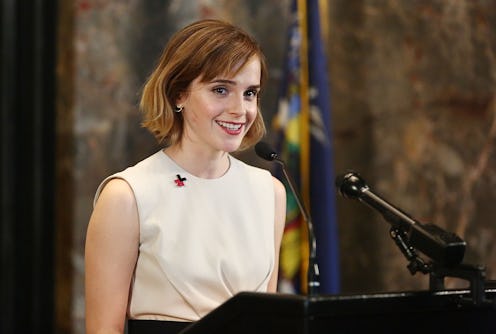Instead of taking on more acting roles, Emma Watson shifted her goals for 2016. She's devoting the entire year to feminism. The UN Women Goodwill Ambassador told Paper magazine she wants to focus on personal development and listen to as many women as possible. Making Hermione Granger proud, the actor also plans to read a bunch of books — she even started her own feminist book club called #OurSharedShelf. On Tuesday, Watson joined Forest Whitaker for the launch of UN Women's HeForShe Arts Week at the Public Theater in Manhattan. Coinciding with International Women's Day, HeForShe's inaugural Arts Week supports and celebrates gender equality through arts and cultural organizations. Throughout the launch event, Watson highlighted how the arts can spur social change.
When the Harry Potter alum first took the stage, she quoted fellow artist and activist, Maya Angelou, who she dubbed one of her favorite women: "I’ve learned that people will forget what you said. People will forget what you did. But people will never forget how you made them feel." Watson said this sums up why she loves being an actor — the ability to make people feel something. She explained,
We have to do more than help people see the logic [of gender equality] with their minds. It’s also about making them feel it in their bones. Viscerally. Emotionally. This is what changes us. It’s what makes us act. You can’t unwatch great films. You can’t unread incredible books. You can’t unsee groundbreaking art. They change you forever.
This powerful quote conveys the true impact of the performing arts — why people pack into movie theaters, sing along at concerts, or spend hours curled up with a good book. What people see onscreen or in a museum can inspire them to stand up and fight injustice themselves. This reflects the entire purpose of the HeForShe Arts Week — championing diversity through creative outlets and spreading messages of equality. During the inspirational conversation, she provided examples of works that have helped spark change in this area.
Focusing in on gender roles in the media, Watson discussed the way masculinity is perceived in the performing arts and "how rigid sometimes those definitions of what a leading man can and can’t do and how he should and shouldn’t act" are. But not all hope is lost; she listed movies that have successfully fought against those stereotypes:
When I think about films like The Pursuit of Happyness, where you see a man in the role of a primary caregiver; when you see Billy Elliott, The Color Purple, Brokeback Mountain, you see these pieces of art challenging those very rigid definitions.
When these kinds of roles are portrayed, it impacts not only actors, but society in general. Watson said, "They make the roles that each of us get to play more complex, more whole, more real, more authentic. They make our jobs more interesting and truthful. I think gender equality does that." By that same token, it's important for the roles females take on to reflect more whole, complex characters too — it can lead to the same progressive effect.
She also acknowledged Sam Taylor-Johnson's "Crying Men" photo series, which Whitaker participated in. Watson called the photographs beautiful and joked that they "really challenged the notion that men don't have tear ducts." Although the audience got a laugh, the idea of men expressing their emotions is important; as is the idea of works of art portraying women in a range of feelings and roles too. Both genders are equally complex and shouldn't be stifled by stereotypes.
It's not just movies or photographs that fall under the arts umbrella. Watson believes that literature can move equality forward too. Giving a shoutout to her book club, she said, "#OurSharedShelf book this month is a book by bell hooks. It’s called All About Love: New Visions. It’s wonderful, I finished it yesterday." Last month's book was Gloria Steinem's My Life on the Road and fans can visit GoodReads to join the ongoing discussion. According to the website, she tries to choose books that are "funny, inspiring, sad, thought-provoking, empowering."
As for why the arts and social justice matter, Watson perfectly captured their overlapping relationship. "Great movements of social and human progress have always been illuminated by great art," she said. "Social progress can inspire art and the arts can inspire social progress."
